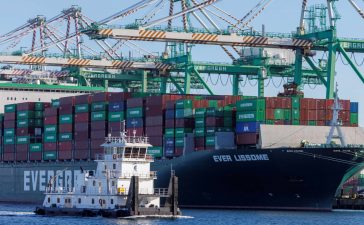HSBC is facing a “hit” of more than £6.3billion as a result of unsecured commercial property loans into China, a UK-based tax consultant has warned.
Bob Lyddon branded the situation a ‘disaster’ – and warned of a “financial contagion” risk which could have a knock-on effect on Britain’s economy.
HSBC earlier this month confirmed it was setting aside £910million to cover expected loan losses, including £412million related to the commercial real estate sector in China – but Mr Lyddon said the actual picture was much worse.
The founder of Lyddon Consulting Services outlined his concerns in an analysis specifically written for Express.co.uk – and has urged the bank not to underestimate the seriousness of the situation.
He explained: “HSBC’s stake in its Chinese bank – Hang Seng – looks overvalued by £3.3billion given the benchmark set by Standard Chartered.
“Forty-two percent of HSBC’s commercial property loans into China are either sub-standard or credit-impaired: £4.6billion out of £11billion. That’s a disaster.
“The equivalent figures just for Hong Kong are 63 percent, and £3.8billion out of £6billion. That’s a catastrophe.”
Even worse, £3billion of this £3.8billion was not backed by real-estate security, Mr Lyddon stressed.
He explained: “That’s an oxymoron: they should not be booked as real-estate lending if they are unsecured.
“Are these frauds, where a borrower has used the money meant to construct a building but the site remains vacant?
“Or, if there is a building and the borrower has defaulted on the loan, are the bank’s mortgage papers defective so it cannot repossess? What is going on?”
He added:”What was the bank thinking of to enter unsecured lending into its accounts as real-estate lending? What were the auditors thinking of when they signed the accounts off?
“What about financial regulators who are supposed to check the adequacy of banks’ capitalisation – do they allow HSBC to fund these loans with the lower level of capital appropriate to secured (ie real) real-estate lending? What are the guidelines of the Financial Reporting Council for a case like this?”
Given the state of the Hong Kong property market, the unsecured portion of these loans should be written off, Mr Lyddon said.
He continued: “That’s a £3billion hit to go with the £3.3billion hit on the value of Hang Seng Bank: a total hit of £6.3billion instead of the £400 million hit that HSBC has actually taken.”
The shortfall “knocked a hole in the bank’s equity”, and meant it would have to cut back on business elsewhere, including in the UK, Mr Lyddon said.
He added: “It is four percent of HSBC’s equity, which may not sound a lot, but that supports upwards of £120billion of lending, which would have to be eliminated.
“What’s more, if their current group-wide practices have permitted the bank to put on so many bad loans in Hong Kong, the bank’s entire global loan book needs to be vetted to see if Hong Kong is an outlier, or whether the average quality is lower than it appears.”
If so, the impact was multiplied: more of the bank’s equity would have to be reserved against the poorer loans, and the amount of other loans which would need to be eliminated would be much more than £120billion, including loans to UK borrowers.
Mr Lyddon concluded: “That’s the contagion risk: loans to UK consumers and businesses have to be cut back if losses in Hong Kong, the rest of China and anywhere else blow a hole in the bank’s equity.”
Express.co.uk has contacted HSBC for comment.
HSBC UNSECURED real estate lending: Q3 2023 (By Bob Lyddon)
HSBC booked a £400 million write-down on its commercial real estate lending into China in Q3 2023, but the damage is surely far higher.
There has been no write-down in the value of its 62 percent stake in Hang Seng Bank – Standard Chartered Bank took a £562million write-down on its 16 percent stake in China Bohai Bank, which is 28 percent of its value at the turn of the year. An equivalent write-down by HSBC on its Hang Seng stake would have been £3.3 billion. After all, Hang Seng Bank and China Bohai Bank operate substantially in the same market.
The £400 million write-down, solely on commercial property loans, also looks pretty light when one considers that Standard Chartered Bank took a £150 million hit on a portfolio of £2.2 billion which is 6.8 percent. HSBC has a portfolio of £11 billion (US$13.6 billion) with a write-down of £400 million being 3.6 percent of that. The difference of 3.2 percent would have caused HSBC a further £352 million write-down.
So we potentially have further write-downs for HSBC of £3.7 billion to bring it to the same place as Standard Chartered.
Even if its write-downs on commercial property lending had been £752 million rather than £400 million, that would only partially reflect the deep problems in its portfolio. HSBC’s portfolio of Chinese commercial property lending contains £1.8 billion of loans rated as ‘sub-standard’ (the fourth category of credit quality out of five), and £2.8 billion rated as ‘credit impaired’, the fifth and
lowest category. That is £4.6 billion, or 42 percent of the whole portfolio, that is ‘sub-standard’ or worse, with a particular concentration of bad business booked by HSBC itself in Hong Kong, where Hang Seng Bank is headquartered.
Hang Seng Bank has both a residential mortgage book and a portfolio of commercial property lending of its own, but here we are just looking at HSBC’s own China commercial property lending.
£6.0 billion of its £11 billion portfolio is booked in Hong Kong, and out of this £6.0 billion £3.8 billion (or 63 percent) is rated either as ‘sub-standard’ (£1.2 billion) or as ‘credit-impaired’ (£2.6 billion).
And now we come to the most totally incredible thing:
- £0.9 billion out of the £1.2 billion ‘sub-standard’ is UNSECURED
- £2.1 billion of the £2.6 billion ‘credit impaired’ is UNSECURED
This means that 79 percent of the portion of the Hong Kong loan book into commercial property
(£3 billion out of £3.8 billion) that is of poor quality is also UNSECURED
Since when was any ‘real estate lending’ UNSECURED?
According to the Corporate Finance Institute, ‘Commercial real estate (CRE) lending refers specifically to credit that is created to finance or refinance commercial property.’ It lists various types of finance but then states that ‘The common thread among all forms of CRE lending is that physical property serves as collateral to secure the credit exposure’.
If real estate lending is unsecured it should be entered into the bank’s accounts as personal lending if the borrower is an individual, or as corporate lending if the borrower is a non-personal legal entity, like a company, trust or limited liability partnership.
Are HSBC’s loans unsecured because of fraud – e.g. the loan has been drawn down to finance construction but the money has been siphoned off and no edifice has resulted?
Are HSBC’s loans unsecured because of defective documentation – e.g. the loan has defaulted but the edifice cannot be repossessed by the bank because its legal paperwork does not permit it?
The problem extends to financial reporting: an investor, credit analyst or share analyst surely has the right to assume that any loan categorized as ‘real estate lending’ or ‘residential/commercial property lending’ is secured with a mortgage.
Not only that, the bank’s financial regulators would assume that loans categorised under ‘real estate lending’ were secured, not least because they then qualify for a much-reduced allocation of capital to be held against them.
Why have the auditors signed off the accounts with loans booked into the account chart as ‘real estate lending’ when they are unsecured?
What has the Financial Reporting Council got to say about this?










